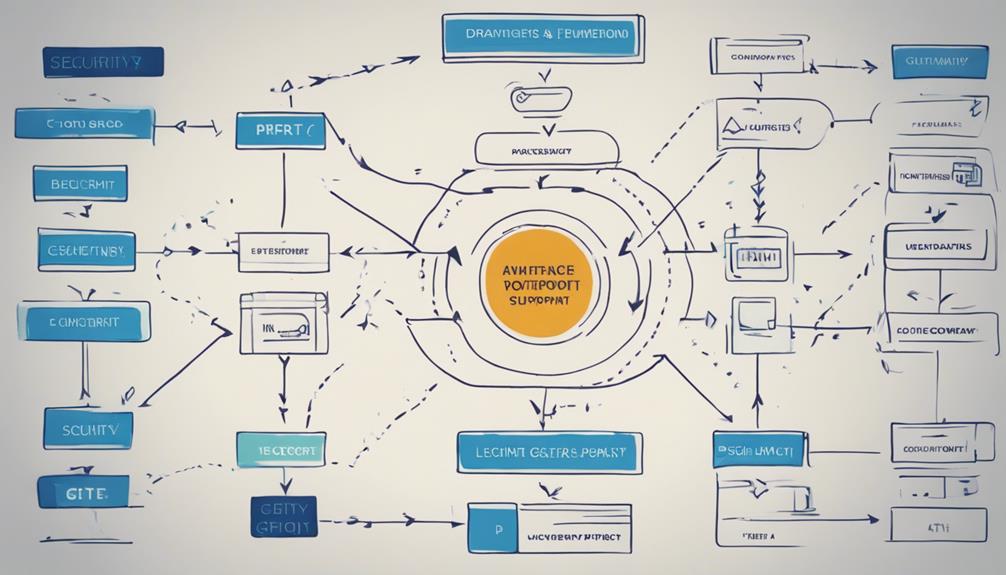When launching a payment gateway, prioritize security with AES encryption, tokenization, and PCI DSS compliance. Adhere to industry regulations to enhance fraud prevention and user trust. Optimize the user experience with intuitive interfaces and clear labeling. Guarantee scalability for handling transaction volumes by focusing on processing efficiency. Emphasize high-performance processing for seamless transactions. By considering these key aspects, you can lay a strong foundation for your payment gateway's success. Your venture into the world of online payments demands meticulous planning and execution in these critical areas.
Key Takeaways
- Implement AES 256-bit encryption for data security.
- Ensure compliance with PCI DSS standards.
- Optimize user experience with intuitive interfaces.
- Prioritize scalability for handling transaction volumes.
- Emphasize performance in payment processing for efficiency.
Security Measures for Financial Data

To guarantee the utmost protection of sensitive financial data, implement advanced encryption standards like AES 256-bit and utilize tokenization in your payment gateway system. Encryption standards play an essential role in securing financial data by encoding it in a way that only authorized recipients can decipher.
Tokenization further enhances security by replacing sensitive card information with unique tokens, reducing the risk of unauthorized access to payment data. Compliance with PCI DSS standards is important to safeguarding payment information and preventing breaches.
Secure APIs ensure the safe transmission of data during transactions, adding an extra layer of protection. Regular security audits and penetration testing are critical practices to identify and address vulnerabilities promptly, ensuring a robust defense against potential threats.
Compliance With Industry Regulations

Ensuring compliance with industry regulations, such as PCI DSS, is imperative for securely handling payment data and safeguarding against potential risks. Payment gateways must adhere to PCI compliance standards to protect sensitive customer data from unauthorized access.
By following financial regulations and compliance requirements, businesses can enhance fraud prevention measures and build customer trust. Non-compliance not only risks fines and penalties but also damages the reputation of the payment gateway provider.
Implementing robust fraud detection mechanisms and maintaining a thorough Privacy Policy are essential steps in upholding customer trust and safeguarding their data. Regular audits and assessments help in ensuring ongoing adherence to industry standards, such as GDPR, which protect customer privacy.
Optimizing User Experience for Transactions

When aiming to optimize user experience for transactions on payment gateways, prioritizing an intuitive interface is essential. User experience plays a vital role in driving conversion rates, with potential increases of up to 35% in online transactions.
Collaborating with a UX team can greatly boost user engagement on payment gateways, potentially leading to a 400% increase. An intuitive interface not only enhances user satisfaction but also reduces user errors by a notable 50% during the payment process.
Simplifying payment processes can have a substantial impact, potentially decreasing cart abandonment rates by 70%. Clearly labeling essential features on payment gateway platforms can improve user satisfaction by 60%, ensuring a smoother transaction experience.
Scalability for Handling Transaction Volumes

Prioritizing scalability for handling transaction volumes is vital when developing a robust payment gateway system. To accommodate business growth and guarantee processing efficiency, your payment gateway must be able to handle high transaction volumes seamlessly.
Features like load balancing and server clustering are essential in supporting scalability, allowing your system to adapt to fluctuating transaction demands without experiencing system overload. Scalability is key in enabling your payment gateway to manage peak periods without compromising performance.
Emphasizing Performance in Payment Processing

To achieve peak results in payment processing, focus on enhancing performance to guarantee swift and efficient transactions. When emphasizing performance in payment processing, consider the following key aspects for best results:
- Efficient Processing: Make sure that your payment gateway operates with speed and accuracy to facilitate quick transaction processing.
- Enhanced User Experience: Prioritize a seamless and user-friendly interface to improve customer satisfaction and retention.
- Increased Conversion Rates: By optimizing performance, you can boost conversion rates and drive revenue generation for your business.
- Reduced Cart Abandonment: Improved performance can help in reducing instances of cart abandonment and increasing successful transactions.
Frequently Asked Questions
What Are the Requirements for Payment Gateway?
To launch a payment gateway successfully, you must prioritize secure authorization methods like two-factor identification and guarantee support for multiple currencies like USD, EUR, and GBP. Implement robust fraud detection measures such as AML and KYC practices, integrate with various processors for flexibility, and provide a seamless user experience with easy payments and clear interfaces.
These requirements are essential for establishing a reliable and efficient payment gateway for both merchants and customers.
What Is the Most Important Factor in Choosing a Payment Gateway?
When selecting a payment gateway, security is paramount. With 60% of customers prioritizing secure transactions, it's important to guarantee your customers' data is protected.
Additionally, a user-friendly interface is essential as 67% of customers abandon complex checkouts. Providing multiple payment options caters to 42% of customers' preferences.
Quick processing speed is essential, with 47% expecting speedy transactions. Lastly, transparency in fees matters, with 53% valuing clear information on charges.
What Are the Important Considerations for Payment Processing?
When processing payments, it's vital to take into account factors like:
- Payment method support
- Currency compatibility
- Transaction volume handling
- Fraud prevention
- Reporting tools
These aspects guarantee smooth operations and customer satisfaction. By evaluating these elements, you can launch a payment gateway that meets your business needs efficiently.
Prioritize these considerations to establish a reliable and secure payment processing system for your clients.
What Are the Functional Requirements for Payment Gateway?
When launching a payment gateway, make sure it meets functional requirements. These include securely transmitting payment data, supporting various payment methods, complying with industry standards like PCI DSS, providing encryption and fraud prevention, and enhancing user experience.
Prioritize seamless and secure online transactions by choosing a gateway that offers robust security features. Selecting a reliable payment gateway is vital for facilitating trustworthy transactions and safeguarding sensitive payment information.
Conclusion
As you launch your payment gateway, remember that security is key. Just like locking the door to your house at night, you want to protect your financial data from unwanted intruders.
By staying compliant with regulations and optimizing user experience, you'll build a strong foundation for success. Think of your payment gateway as a fortress, guarding against potential threats while providing a seamless experience for your customers.
Keep these considerations in mind, and you'll be on the path to secure and efficient transactions.











